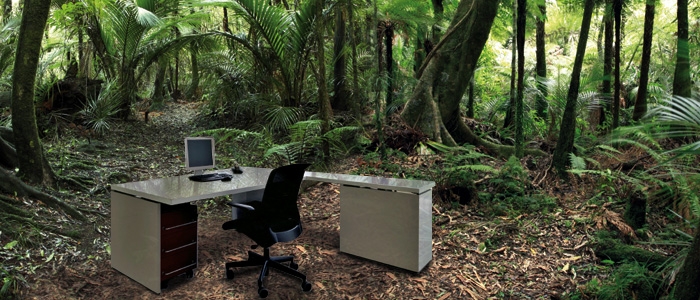 What lengths would you as an employer go to, to ensure that your employees are as motivated and as productive as possible? You could reward them with a company car, which would probably break the bank and become extremely expensive depending on how big the size of your company is. Or you could encourage them to come into work and give their best by giving them more time off work, which may sound like a paradox and it isn’t. Or you could create a climate – not just figuratively-speaking, but literally – which will enable them to focus willingly and happily on their job and perform their task to the best of their abilities and enable them to achieve maximum results. How? Quite simple really. By welcoming them to the jungle.
What lengths would you as an employer go to, to ensure that your employees are as motivated and as productive as possible? You could reward them with a company car, which would probably break the bank and become extremely expensive depending on how big the size of your company is. Or you could encourage them to come into work and give their best by giving them more time off work, which may sound like a paradox and it isn’t. Or you could create a climate – not just figuratively-speaking, but literally – which will enable them to focus willingly and happily on their job and perform their task to the best of their abilities and enable them to achieve maximum results. How? Quite simple really. By welcoming them to the jungle.
Plants do not only look nice, they have a proven positive effect on both the human body and people’s psyche. Without even really trying, a plant can not only significantly improve the air around your desk and in your office by converting carbon dioxide, which in higher concentrations can make you feel fatigued and bursting with lethargy, into fresh oxygen, sugar and other so-called waste products, it can also significantly improve your mood and change your entire outlook. And in the right mood and with the right motivation, well, to quote two legendary Motown greats, “there ain’t no mountain high enough” and “no river wide enough” to stop you from performing at your best.
There are various reasons for putting plants in your workplace or office: for one, plants are little miracles of nature. Not only are they capable of photosynthesis, the process outlined sketchily above, they also filter germs and other potentially harmful pollutants and dust out of the ambient air and increase the relative humidity in the rooms they are in. In addition they absorb noise – and some would say stress – and reduce minor ailments and even staff absence. This may at first sound a little far-fetched, but the longer you dwell on the notion, the more sense it seems to make. If an employee is happy at work, then his or her immune system is in better shape, which means that he or she is also in a better shape to cope with the challenges which one’s job and each new day brings. Moreover, employees who actually enjoy going to work, not least of all because they like their workplace, will inevitably call in sick less often than they would if each day was an endless uphill toil.
In a survey carried out by Dr. Virginia Lohr of Washington State University, 27 test participants were required to work with a computer program which was designed to test their productivity and induce stress thereby effectively creating a simulated office environment. The participants’ reactions, their mental and emotional state, and their blood pressure were monitored meticulously. The tests were carried out with plants and without plants. The plants that were present at the individual workstations were arranged in clusters that the test persons could only see from the corner of their eye. Yet that made all the difference. Stress levels dropped dramatically, productivity increased (by 12%), reaction times were shorter and attentiveness higher. The results could hardly have been more conclusive.
Different plants have different effects and should not be chosen exclusively according to their aesthetic value (who was it who once said that beauty was in the eye of the beholder?). Certain plants are ideally suited for offices, laboratories, workshops and even certain manufacturing facilities. These plants work wonders against toxic fumes that are emitted from furniture and office equipment, for example, and can relieve symptoms like headaches, smarting eyes and irritated mucous membranes.
Here are just a few of the plants which are excellently suited for the scenarios mentioned above:
- Galingales, which give off more water into the air than most plants
- Aspidistras, or rubber plants, are capable of absorbing various toxic substances
- Ivy and spider plants are excellent at soaking up carbon dioxide
- Cactuses neutralise electrosmog which is emitted by countless devices in the office, like mobile phones or computers
Of course you don’t really have to change your office into a jungle to reap the maximum rewards. Just a few plants here and a few strategically placed plants there and you will soon see what an effect these various forms of vegetation can have not only on your mood but also on the indoor climate. The BZ25 air quality meter from Trotec can provide you with exact information on essential climate data like the relative humidity, CO2 concentration and the temperature.
 Not only does the BZ25 monitor CO2 levels, it can also be programmed to sound an alarm when thresholds are exceeded and the air quality in the room or office you are in has deteriorated. In addition, the meter is equipped with a comfort zone indicator which can tell you at a glance whether your room climate is OK and everything is in the green! And as if that were not enough it displays the time and date and can be used instead of an alarm clock.
Not only does the BZ25 monitor CO2 levels, it can also be programmed to sound an alarm when thresholds are exceeded and the air quality in the room or office you are in has deteriorated. In addition, the meter is equipped with a comfort zone indicator which can tell you at a glance whether your room climate is OK and everything is in the green! And as if that were not enough it displays the time and date and can be used instead of an alarm clock.
Create your own clean, healthy and comfortable indoor climate – with the right plants and the right climate measuring devices – from Trotec.
Trotec. Solutions for a better climate.

